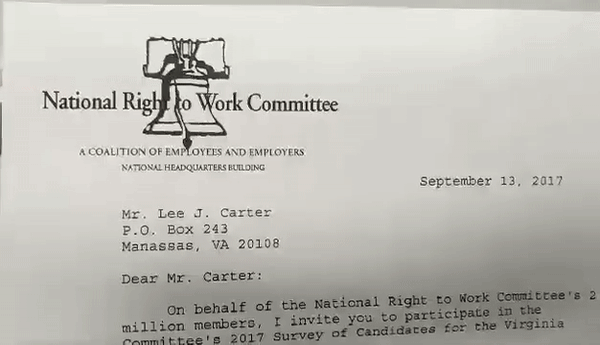For many workers, the hustle and bustle of the holidays offers an opportunity to pick up extra pay through seasonal employment. Nationally, more than 700,000 Americans found seasonal work in 2018, according to one estimate of federal jobs data reported by CBS News.
However, those holiday paychecks could be getting smaller, if Virginia lawmakers succeed in repealing Virginia’s Right to Work law, which provides that employees cannot be forced to join a labor union or pay union dues as a condition of employment.
One viral news report out of Massachusetts illustrates how.
“Seasonal UPS Workers Had Almost Entire Paychecks Handed Over To Union,” reported CBS4 Boston, in covering the payroll plight faced by seasonal workers who were expecting to keep most of their earnings.
Sheila O’Malley, who spoke with CBS4, said her $500 paycheck was reduced to just $14.52 after the Teamsters Local 25 deducted its union fee.
“Financially it was crippling,” she said to CBS4. “It seemed like a few hundred dollars but that money was already spent and then we didn’t have it.”
As short-term employees, seasonal workers face a disproportionate burden from union fees assessed on temporary or part-time jobs.
Because Massachusetts is not a Right to Work state, the union was able to require that O’Malley pay union dues if she wanted to work at UPS.
The problem is not an isolated occurrence. Similar reports surface every year, spawning public outrage at news headlines, discontentment on employee message boards, and even complaints to the NLRB.
UPS is commonly named in these reports, as the package giant is a unionized workplace with a substantial seasonal workforce — over 100,000 in 2018.
The legality of these payroll deductions depends on state law.
Seasonal UPS worker Dale Thrasher of Avon, Indiana faced a similar predicament, but with a starkly different outcome in his Right to Work state.
Thrasher had spent several years as a seasonal worker for UPS, until 2014, when company officials told him union membership was a condition of employment during a pre-holiday driver orientation.
He objected and said he was not interested in joining the union.
“Here at UPS, you have to join the union,” one manager told him, before having Thrasher escorted off the property.
Thrasher ultimately won his job back and received a settlement for the time he couldn’t work, after receiving assistance from attorneys with National Right to Work Legal Defense Foundation.
Had Indiana not adopted Right to Work in 2012, Thrasher could have been required to join the union or pay membership dues as a condition of employment.
Virginia’s Right to Work law was enacted in 1947 and has enjoyed strong bipartisan support in the eight decades since — until recently.
“We don’t have a right-to-work issue here,” minority leader David Toscano (D-Charlottesville) told NBC29 in 2012. “No one’s arguing that it should be repealed in Virginia, so I don’t see what the rationale is.”
That changed in 2017 when a new class of freshmen Democrats, inspired by the presidential campaign of Sen. Bernie Sanders (I-VT), campaigned on left-wing positions and won in a “wave” election featuring strong Democratic turnout.
Since then, the House Democratic caucus has tacked sharply leftward, led by lawmakers such as Del. Cheryl Turpin (D-Virginia Beach) and Del. Lee Carter (D-Manassas).
Earlier this month, Turpin seemed to suggest repealing Virginia’s Right to Work law, while Carter took a more antagonistic approach during his campaign, sharing a video of himself feeding a letter from the National Right to Work Committee into a paper shredder.

“Yes, I will work to overturn Virginia’s RTW laws,” Carter would later tweet, in response to an inquiry from the Virginia Chamber of Commerce.
Earlier this month, Carter filed legislation granting unionized public employees the right to strike and walk off the job, even in cases where such labor disputes would close down schools, threaten public safety, or shut down essential government functions.
For now, Virginia’s seasonal employees remain protected from payroll deductions like those faced by Sheila O’Malley in Massachusetts, though that could change as soon as the 2019 legislative session, if lawmakers like Carter and Turpin get their way.
Unlike other states which have incorporated Right to Work policies in their constitutions, Virginia’s law remains subject to repeal by a legislative majority with the governor’s signature.
If not in 2019, that repeal could be one election away.





